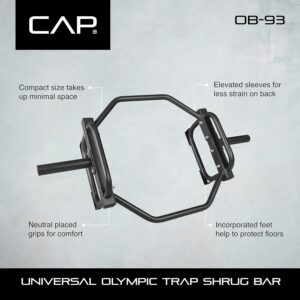In the world of strength training, few pieces of equipment have transformed muscle-building quite like the trap bar (also known as a hex bar). This ingenious piece of equipment is a game-changer for lifters seeking to maximize muscle gains while minimizing injury risk.

What Makes the Trap Bar Special?
Unlike traditional straight barbells, the trap bar features a unique hexagonal design that allows you to stand inside the bar’s frame. This geometric marvel fundamentally changes how you perform key lifts, particularly the deadlift, by creating a more natural movement pattern that benefits both novice and advanced lifters.
Biomechanical Advantages
The trap bar’s design offers critical biomechanical benefits:
- Centered load distribution directly over your body’s center of gravity
- Reduced spinal compression compared to traditional deadlifts
- More upright torso position, reducing lower back strain
- Enhanced ability to generate power through a more vertical lifting path
Muscle Gain Potential
For individuals focused on hypertrophy and strength, the trap bar delivers exceptional results across multiple muscle groups:
Primary Muscle Engagement
- Quadriceps
- Glutes
- Hamstrings
- Trapezius
- Lower back muscles
- Core stabilizers
Unique Muscle Building Benefits
- Reduced Injury Risk: The neutral grip and balanced load significantly decrease the likelihood of technique-related injuries.
- Versatile Training: Adaptable for various rep ranges and training goals, from explosive power to pure hypertrophy.
- Technique Accessibility: Easier learning curve compared to conventional deadlifts, allowing faster progression.
Programming for Maximum Gains
To maximize muscle gains with the trap bar, consider these strategic approaches:
Recommended Training Protocols
- Hypertrophy Focus: 3-4 sets of 8-12 repetitions
- Strength Development: 4-5 sets of 4-6 repetitions
- Power Generation: Incorporate lighter weight with explosive movements
Advanced Techniques
- Tempo variations
- Paused reps
- Drop sets
- Cluster training
Common Mistakes to Avoid
Even with the trap bar’s user-friendly design, lifters should be mindful of:
- Maintaining a neutral spine
- Controlling eccentric (lowering) phase
- Avoiding excessive momentum
- Proper foot placement
The Scientific Edge
Research consistently demonstrates the trap bar’s effectiveness. A study in the Journal of Strength and Conditioning Research found trap bar deadlifts generate higher peak force and power output compared to conventional deadlifts, translating directly to enhanced muscle development potential.
Final Thoughts
The trap bar isn’t just another piece of gym equipment—it’s a strategic tool for serious muscle builders. By offering a combination of safety, efficiency, and muscle-building potential, it represents a sophisticated approach to strength training.
Whether you’re a beginner seeking a safer entry point into heavy lifting or an advanced lifter looking to optimize muscle gains, the trap bar deserves a prominent place in your training arsenal.
Hey there! We hope you love our fitness programs and the products we recommend. Just so you know, Symku Blog is reader-supported. When you buy through links on our site, we may earn an affiliate commission at no extra cost to you. It helps us keep the lights on. Thanks.
Disclaimer: The information provided in this discussion is for general informational and educational purposes only. It is not intended as medical or professional advice. Only a qualified health professional can determine what practices are suitable for your individual needs and abilities.

